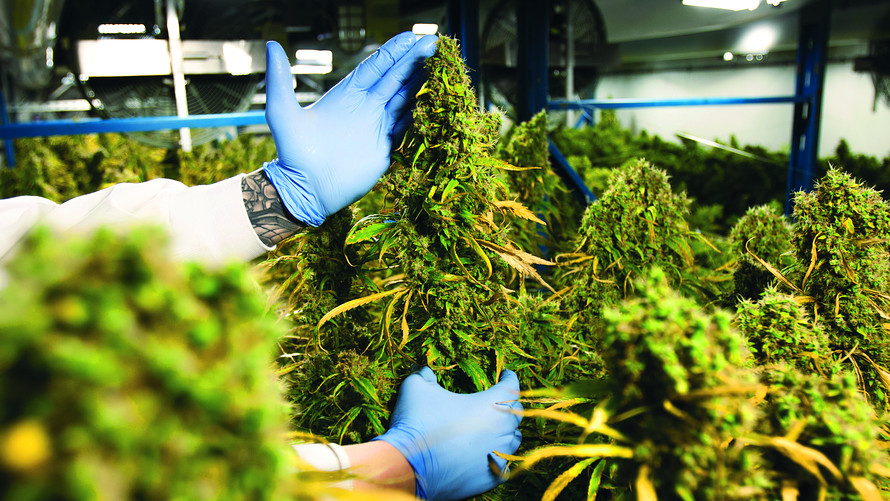You are here
Home 🌿 Medical Cannabis News 🌿 Cannabis companies say they are growing enough pot, they just can’t deliver it 🌿Cannabis companies say they are growing enough pot, they just can’t deliver it

One pesky stamp has become the symbol of a continuing problem in Canada: Pot producers struggling to get enough cannabis to market, at least in the ways that buyers want it. Pot producers had to scramble to apply the required excise-tax stamps with no glue as legalization kicked off last October, and many are still having to apply them by hand to some packages months later as supply issues continue.
While Organigram OGI, -10.21% OGRMF, -9.66% has figured out how to automate its production of some products, the Moncton, New Brunswick-based company still must manually apply the tax stamps onto its raw-marijuana containers, Chief Executive Greg Engel told MarketWatch in an interview Monday.
“Our pre-roll equipment puts [the tax stamp] on automatically, the oil line does it automatically, but the dry flower jar line, we just can’t get it automatic,” Engel said, adding that he hopes to have a fix in two weeks.
Organigram on Monday joined a chorus of companies saying their challenge in supplying the Canadian cannabis market is not growing massive amounts of marijuana, but transforming the plant into a product that’s ready for sale. Engel said that his company had nearly $30 million worth of dried cannabis at the end of its most recent quarter that it still needed to process, more than it brought in actually selling cannabis in the quarter. In order to meet demand, the company has begun staffing some parts of its operations 24 hours a day, seven days a week, and it has now contracted Valens Groworks Corp. VGWCF, +7.21% to perform some of the extraction while expanding its in-house capabilities.
Other cannabis producers have discussed issues processing marijuana, including several — Tilray Inc.TLRY, -6.94% and Aurora Cannabis Inc. ACB, -4.17% ACB, -3.89% , among them — that have brought up that pesky stamp. Hexo Corp. HEXO, -4.92% Chief Executive Sebastien St-Louis has said that the entire sector failed to anticipate supply-chain problems that have hurt supply as Canada builds out the world’s first recreational-pot industry in the developed world.
Organigram stock fell 9.7% in Monday trading, though Jefferies analyst Owen Bennett called the results “impressive” in a note, saying Organigram’s recreational pot sales were second only to Canopy Growth Corp.WEED, -3.39% CGC, -3.69% , which is the world’s largest pot company by market valuation.
Organigram has built up its production and distribution side to match the need for pre-rolled joints, especially. With the automation currently running at Organigram’s facilities, Engel said the company is able to produce more than 40,000 pre-rolled joints a day and has produced 2.6 million in total as of Monday.
As Engel manages to meet consumer demand for joints, however, their tastes are changing. Cannabis oils, Engel said, are no longer a big seller and sales are slipping, but there is now a massive amount of demand for products derived from cannabidiol, or CBD, a nonintoxicating cannabinoid found in cannabis plants.
“Provinces are desperate for CBD products, private retailers are desperate,” Engel said. “When you look at what’s changed [since Oct. 17], there’s been a lot of noise and interest in CBD.”
Two new variables will be introduced this year, as edible products and vaporizers launch in the fall — currently they are illegal in Canada under the Cannabis Act. Engel said Organigram plans to launch vapes and a chocolate product, which could only add more production uncertainty. Vape hardware and accessories, for example, are almost exclusively produced in China and have been affected by the trade war between the U.S. and China. Engel said Organigram has seen a “minor impact” from the continuing trade battle so far.
Because there are new products coming into the market and many provinces are still struggling to ensure there is adequate supply of what consumers actually want to buy on the shelves, there is an enormous amount of uncertainty for Canadian cannabis companies. Engel said that his team was not comfortable issuing guidance for the third quarter because there are too many variables, with brick-and-mortar retail sales getting under way in Ontario, as of April 1, and Alberta and Saskatchewan continuing to open new locations.
420 Intel is Your Source for Marijuana News
420 Intel Canada is your leading news source for the Canadian cannabis industry. Get the latest updates on Canadian cannabis stocks and developments on how Canada continues to be a major player in the worldwide recreational and medical cannabis industry.
420 Intel Canada is the Canadian Industry news outlet that will keep you updated on how these Canadian developments in recreational and medical marijuana will impact the country and the world. Our commitment is to bring you the most important cannabis news stories from across Canada every day of the week.
Marijuana industry news is a constant endeavor with new developments each day. For marijuana news across the True North, 420 Intel Canada promises to bring you quality, Canadian, cannabis industry news.
You can get 420 Intel news delivered directly to your inbox by signing up for our daily marijuana news, ensuring you’re always kept up to date on the ever-changing cannabis industry. To stay even better informed about marijuana legalization news follow us on Twitter, Facebook and LinkedIn.




